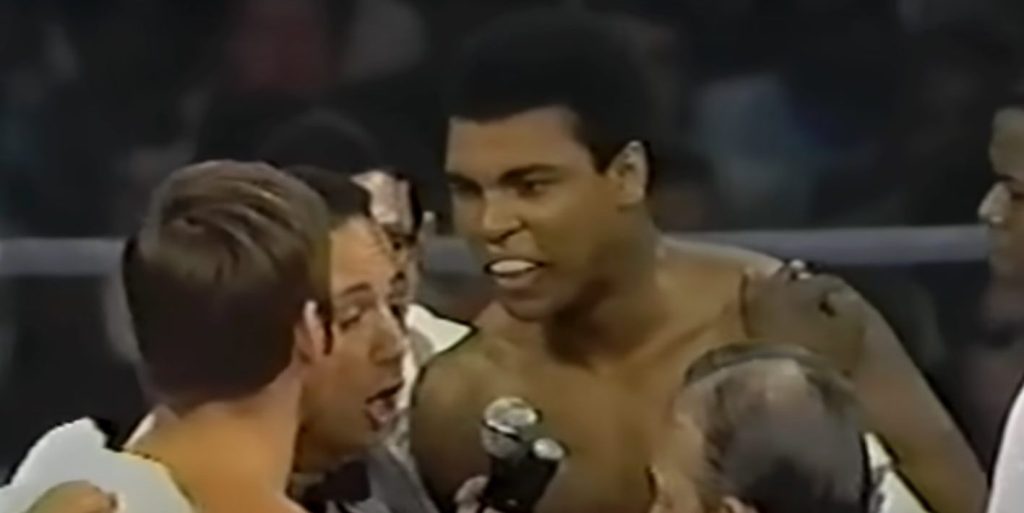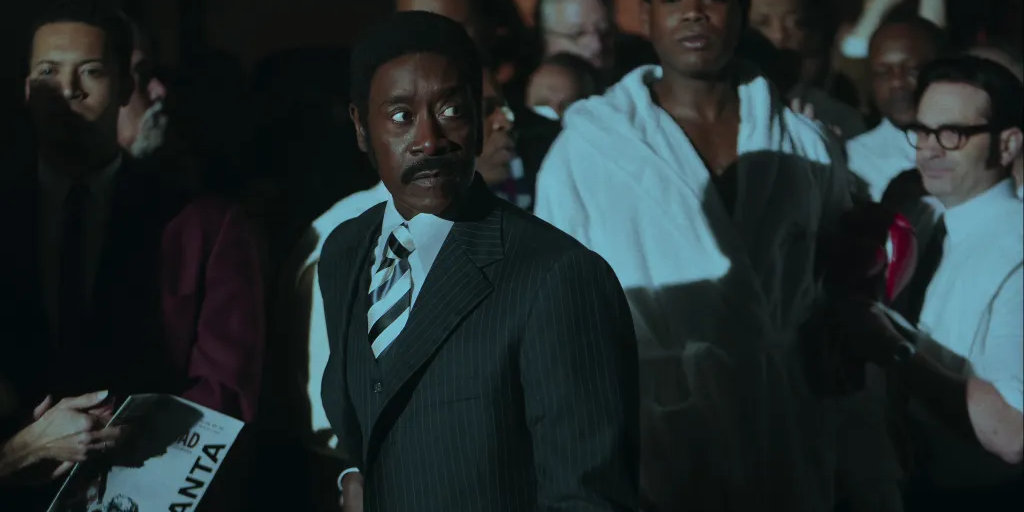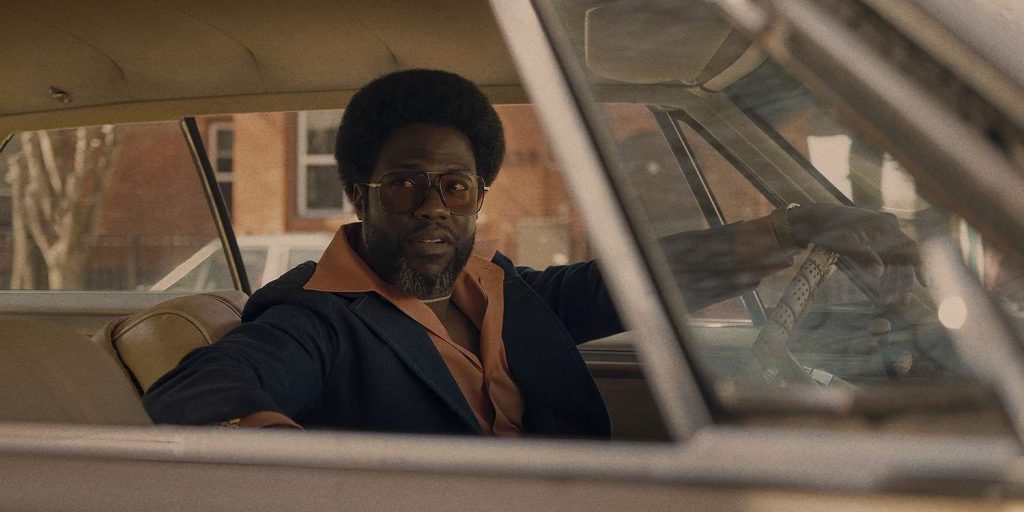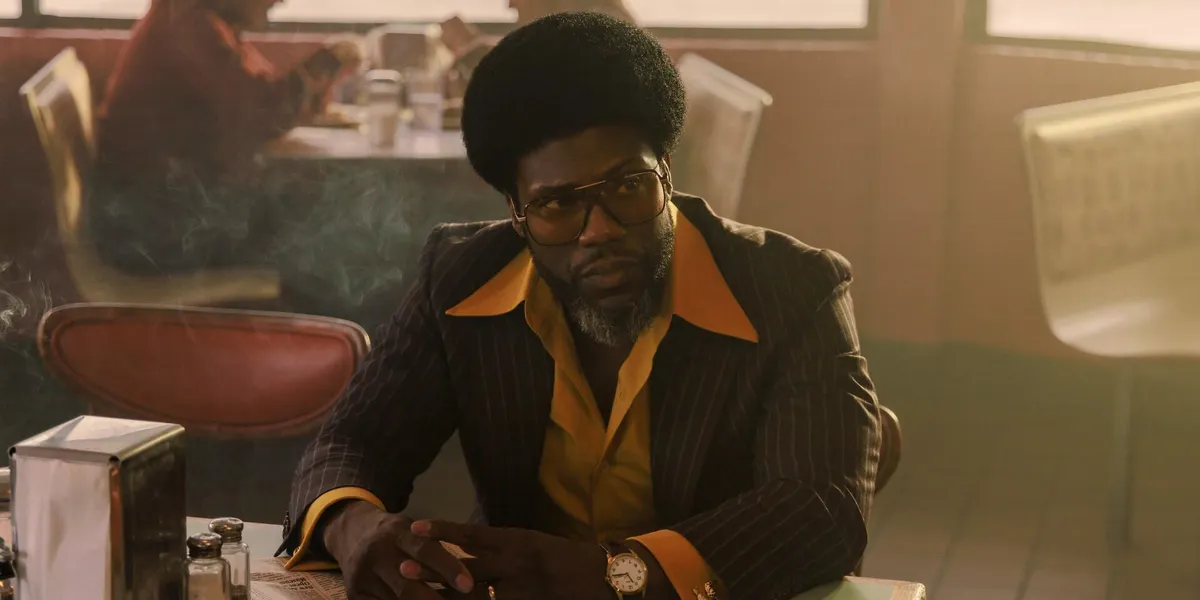Created by Shaye Ogbonna, ‘Fight Night: The Million Dollar Heist’ is a crime drama show that chronicles an armed robbery in Atlanta, Georgia, undertaken by a hustler named Gordon Williams AKA Chicken Man, whose grand ambitions lead him into the city’s underbelly and its criminal fraternity. As the people gear up in anticipation of a monumental fighting event, a heist occurs at an after-party full of the city’s influential crowd, where the guests are flush with cash. Subsequently, Chicken Man has to navigate the aftermath of the events with a tenacious Black detective, J.D. Hudson, snapping at his heels.
The Peacock Show dives into a period-era Atlanta where chaos and opportunity exist as bedfellows for ambitious, high-flying individuals like Chicken Man. With a hale of gunfire flying off in every direction, ‘Fight Night: The Million Dollar Heist’ depicts a cat-and-mouse game between Hudson and Chicken Man as both try to circumvent the sharks circling the murky waters around them. Naturally, the show’s authentic recreation of the 1970s and the proverbial fight night at its heart is sure to raise questions among viewers about its origins and whether it is based on a true story. SPOILERS AHEAD.
Fight Night: The Million Dollar Heist Zeroes in on an Infamous Armed Robbery
‘Fight Night: The Million Dollar Heist’ is based on actual events surrounding Muhammad Ali’s comeback fight against Jerry Quarry in 1970 and the subsequent robbery that happened at an after-party, which authorities believed many underworld bosses also attended. The story was covered in the iHeart true-crime podcast, ‘Fight Night,’ by Jeff Keating and Jim Roberts, which serves as the basis for the show. It was created and written by Shaye Ogbonna, delving into the brazen nature of the heist and the social, cultural, and racial tensions driving change within a city that was quickly modernizing on every front.

On October 26, 1970, three years after Muhammad Ali refused to fight in the Vietnam War and was stripped of his heavyweight title, crowds gathered at Atlanta’s Municipal Auditorium to watch Ali’s marked return to boxing in an epic match for the ages. People of all ilk – celebrities and members of the elite – came to join the common spectator in the excitement of witnessing the revered boxer make his return. However, a few miles from the event, an after-party held by Chicken Man became the target of an armed robbery that became infamous in Atlanta history. According to The Atlanta Journal-Constitution, the party was even attended by high-ranking members of Atlanta and New York’s criminal underworld.
The robbers made off with $1 million after stripping the guests to their underwear in the establishment’s basement. Following the incident, J.D. Hudson, a Black detective on Atlanta’s police force, was assigned the case. He stated at the time that catching the perpetrators was a race against time before other dangerous forces found them first. As per a 1970 report by The New York Times, three men were indicted – McKinley Rogers Jr., James Henry Hall, and Houston J. Hammond – each on six counts of armed robbery. A few months later, Hall and Rogers were shot to death in the Bronx, with Hudson reiterating in a 1971 report, “We said last fall it was just a question of who caught up with them first—the police or the victims. It appears the victims got there first.”
The Show Takes Several Cues and Inspirations From 1970s Cinema
While the center of attention in ‘Fight Night: The Million Dollar Heist’ lies in its true story roots, the show also adopts a unique style and flair that is reminiscent of iconic 1970s films. The choice was a deliberate one for the show’s creator and directors as it harkens back to an era of confidence and bluster. Craig Brewer, who directed four episodes, said, “I was always fascinated by the aesthetic of those films, and the attitude where nothing is subtle and everything comes at you with propulsive music and fashion. It’s about people who are desperate to get what they want, and what they need.” As such, the show is rooted in seminal blaxploitation films of the past, like ‘Shaft‘ and ‘Superfly.’

Creator Shaye Ogbonna also added his take on the material, stating, “Our sensibilities are the same. A lot of the movies we would talk about were movies of the ’70s and blaxploitation. That informed the elevated cinematic aesthetic we wanted in telling this grounded Black story. That’s the look we wanted.” For Brewer, the inspiration came from everywhere, including the works of director Norman Jewison. His 1968 film, ‘The Thomas Crown Affair,’ was especially useful in providing an insight into the use of the split-screen technique, which is also prevalent in ‘Fight Night: The Million Dollar Heist.’
The director said about Jewison’s influence, “I started doing a deep dive of his films. In the final number of ‘Jesus Christ Superstar,’ there’s this moment that is ’70s as all get-out with the Afros and the fashion. I noticed the lights had these wonderful filters on them. I thought that would make a great look for the fight with Ali.“ The visual and atmospheric splendor is part of the allure and immersion of the show that takes a memorable event from Atlanta’s history and provides an additional layer of dramatization through the swagger present on the screen.
Fight Night: The Million Dollar Heist is a Quintessential Atlanta Story
Shaye Ogbonna and Craig Brewer found an immediate connection with the story owing to their personal experiences. “I’m a son of the city and a product of the community,“ Ogbonna said. “With the themes and ideas we are exploring, there is a responsibility that I take very seriously. This is a high-level Black project with a lot of resources. It’s important that the story is told correctly and accurately. You don’t get a lot of opportunities like this.“ As an exploration of a real-life Black story, it defines the roots of Atlanta in many ways by not only going back in its past but also offering an honest but entertaining take on the shifts in the city’s cultural tectonic plates.

“At its heart, this story is about a city that is beginning to embrace its culture,“ Brewer added. “We see that process through the character of Chicken Man, dealing with these gangsters from New York and Chicago who look down on him and how that makes him feel.“ For Ogbonna, the aim was clear – to allow people an insight into Atlanta’s past and what led to its transformation over the years by exploring one of the significant events that gripped the city. He finished by saying, “It all started with these people, just regular folks who made decisions—some good, some bad. It’s about aspirations. We know our history. The South had something to say, and we shouted it very loudly.”
Read More: Fight Night: Is Vivian Thomas Based on a Real Person?


You must be logged in to post a comment.